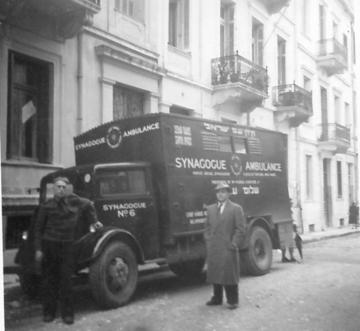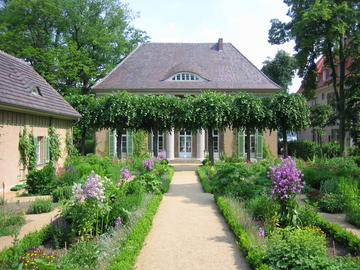Collaborative Doctoral Award opportunities
Two new Collaborative Doctoral Awards have been announced with close associations to the Jewish Country Houses project.
The South, West, and Wales Doctoral Training Partnership has announced a new Collaborative Doctoral Award on the theme of Setting the Holocaust in context: British Jewish Humanitarianism in the 20th century.

Chief Rabbi’s Religious Emergency Council mobile synagogue ambulance in Athens in December 1945
British Jews have a long history of overseas humanitarianism and supporting Jewish migrants and refugees to Britain, but this is only recently being recognised and analysed in the scholarly community. The student would undertake a history of 20thc British Jewish humanitarianism with the Holocaust as its core, exploring its antecedents and marginality in British memory thereafter. The project aims to connect the efforts of the Central British Fund for German Jewry (CBF) and the Chief Rabbi's Religious Emergency Council (CRREC) to (1) elite, liberal traditions of British Jewish activism predating the 1905 Aliens Act, including those of Zionism, migration, and agricultural colonies (2) Jewish intra-communal tensions along the Orthodox/Progressive divide, class, immigration history, and gender roles (3) other Jewish and British traditions of humanitarian activism, intimately connected to war and empire (4) the status of British Jewish humanitarianism post 1945, including CBF’s evolution into World Jewish Relief.
The British Jewish humanitarian tradition is neither a focus of current research on humanitarianism nor a part of British Holocaust consciousness. Conversely, British Jews have yet to be integrated into the narrative of 20th century transnational Jewish activism. This project will contribute to research on British Holocaust consciousness, humanitarianism, British Jewish history, and Jewish international activism. Reframing discussions of Jewish agency in humanitarian assistance is timely given the 2023 Kindertransport anniversary and the 2025 UK Holocaust Memorial opening.
For the Research Questions, Methods and Skills, the Supervisory Team and Institutional Settings, and how to apply, see: https://www.sww-ahdtp.ac.uk/prospective-students/apply/collaborative-doctoral-award-projects-2022/.
The Open-Oxford-Cambridge Doctoral Training Partnership has announced a new Collaborative Doctoral Award: Private actors, public memory and provenance research: Contextualising the Liebermann-Villa, Berlin.
In the past two decades, the identification, research and restitution of objects seized through Nazi persecution has become an obligation for the world’s museums. Following the adoption of the Washington Conference Principles (1998), extensive research has been conducted within public collections across Europe and North America to uncover objects stripped from their original, Jewish, owners during the Third Reich. In 2017 the German Lost Art Foundation (DZK), agreed to fund provenance research projects proposed by non-public actors. This project provides a unique opportunity to explore how the German heritage landscape is being transformed by this shift towards private actors through a focus on the Liebermann-Villa in Berlin: a private museum dedicated to the German-Jewish painter Max Liebermann (1847-1935) and run by the Max Liebermann Society.

The Liebermann-Villa am Wannsee, Berlin
Having recently completed a targeted provenance research project, the Villa provides an ideal launchpad for what will be a pioneering study. Beginning with the Villa’s own project, the student will ask how privately instigated projects differ from those previously carried out in public institutions, and what the implications are for public history, the politics of heritage and Holocaust memory. First, there is the potential to compare developments at the Villa with other former Jewish houses. Second, there is the potential to consider the impact of provenance research on private museums like the Georg Schäfer Foundation in Schweinfurt, which recently paid compensation to the Liebermann heirs for several works previously in Liebermann’s collection. Finally, the student will explore the differing considerations that motivate non-state actors - be they museums, the heirs of looted art, or the owners of contested objects – to undertake provenance research projects, and how that impacts both outcomes and the public narrative. Relevant sources include sale catalogues, inventories, photographs of interiors, object files in museums, and the records of the DZK.
For more information, including the Supervisory Team, Institutional Settings and how to apply, see https://www.oocdtp.ac.uk/private-actors-public-memory-and-provenance-res....


